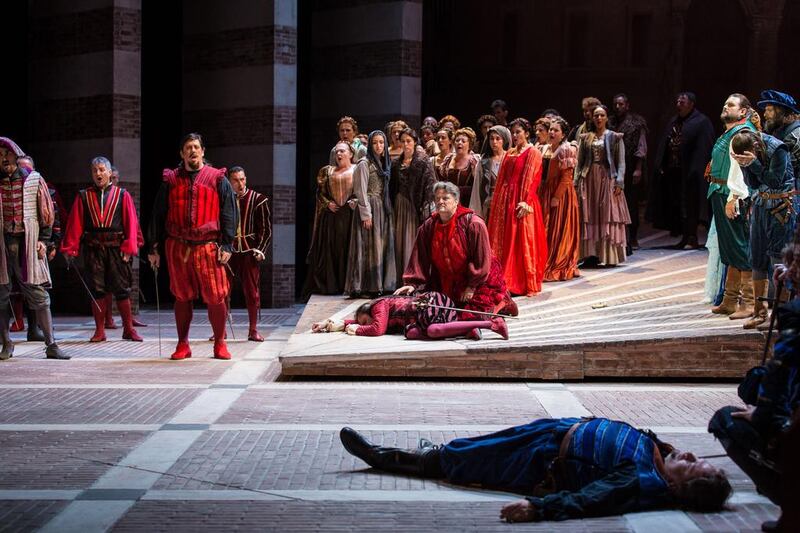'O Romeo, Romeo! Wherefore art thou Romeo?" – the scene featuring those famous words written by William Shakespeare for the world's most popular love story, Romeo and Juliet, played out with fervour at the Royal Opera House Muscat's 2016/17 season-opening performance on Thursday.
For the audience, there was no mistaking where Romeo was – Jean-Francois Borras’s incredible voice and stage presence made sure of that.
The French tenor, who launched his career just 10 years ago, captured the hearts of everyone in the sold-out, 1,100-seat auditorium in Oman with his masterful performance as the male lead in Opera de Monte-Carlo's operatic rendition of Shakespeare's The Tragedy of Romeo and Juliet by 19th century French composer Charles Gounod.
The strength of Borras’s voice and the passion with which he portrayed Romeo’s urgent desire to be with his love, Juliet, were sublime. By the end of the 140-minute performance, there were ovations and tears, as the curtain fell on the touching story of the young, star-crossed lovers.
This was the second time Borras had performed in Muscat, after a secondary role during the city’s inaugural opera season in 2011. Five years later, his development and evolution is quite remarkable – it is certainly easy to see why he is gaining global attention and being touted as the next Placido Domingo.
“It is amazing opening the season here,” said Borras after the show. “Very special. This is a beautiful opera house and I’m glad to be back.”
While he was without doubt the standout performer of the evening, his leading lady, Georgian soprano Nino Machaidze, also captivated the audience with a beautiful performance as Juliet.
She has previously performed the title role on the great stages of Vienna, Los Angeles, Verona, Brussels, Milan and London, and while it took most of the first half for her to build a connection with the audience and make the love story believable, it was as if someone flicked a switch during the intermission.
Following two powerful songs – the aria Que fais-tu, blanche tourterelle delivered by Heloise Mas, who played Romeo's page Stephano, and another piece by an all-male chorus following the dramatic deaths of Tybalt (tenor Christopher Berry in the role of Juliet's cousin) and Mercutio (baritone Lionel Lhote as Romeo's friend) – 33-year-old Machaidze delivered some of the most dynamic and emotional arias and duets of the night.
True to French Baroque operatic tradition, the chorus played a big role in delivering the drama of this classic opera. The orchestra, led by award-winning conductor Laurent Campellone, played their part, too, from the pit pew, which was visible from just about every seat in the house.
I found it a little perplexing, though, that they did not play any soft music between acts to mask the noises coming from the stage as the crew moved the sets behind the curtain.
The acoustics at the opera house are first-class, the architecture and interior decoration stunning, and the atmosphere wonderfully intimate. The costumes were exquisite and the set design simple but effective.
There were many big vocal moments throughout the show, which was very well-received by the audience.
“The first impression is the most important,” the director general of the royal opera, Umberto Fanni, said before the performance, taking place in the year marking the 400th anniversary of Shakespeare’s death. “In all my life as artistic director and general director, I have to think the first show is the most important part, because if you start good, everything else follows.
“My goal is that the people that come to the Royal Opera House be comfortable and feel at home – this has to be considered like a home, not only for the Omani people but for all.”
As for his impressions of the new Dubai Opera, Fanni described it at as “very contemporary” and offering a different style to the Muscat venue, appealing to more commercial productions, but did not rule out future collaborations.
• The next performance at Royal Opera House Muscat is by the Royal Oman Symphony Orchestra’s Ladies Chamber Ensemble in celebration of Omani Women’s Day on October 6. For more details, visit www.rohmuscat.org.om
mhealy@thenational.ae





